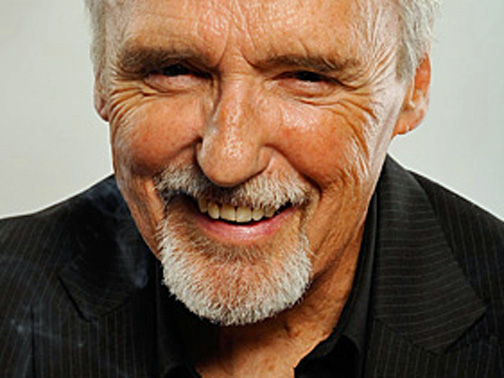Dennis Hopper‘s career began as an actor of alienation in movies like “Rebel Without a Cause.” His career as a director began with “Easy Rider.” His career as an art collector began went he bought one of Andy Warhol’s soup can paintings for $75. His career as a drug abuser began at around the same time, and he told me, simply and factually, “I spent some time in a rubber room.”
Then he got clean and sober, and his careers started all over again, as an actor, as a director, as a photographer much in demand, as a painter, as an icon. Hopper’s death came Saturday at age 74, surrounded by family and friends in the modernist house he built on Venice Beach in Los Angeles and filled with modern art.
For Hopper, life was an art form. His acting took such shape because he was able to reinvent himself as a character. More than many actors, he created characters we remember vividly for themselves: The gang member in “Rebel,” Marlon Brando’s drug-crazed acolyte in “Apocalypse Now,” the terrifying gas-sniffing pervert of “Blue Velvet,” the town drunk in “Hoosiers,” a hit man in “Red Rock West,” the villain in “Waterworld.”
He was also an intellectual, although that side was masked by his somewhat notorious drug abuse, gradually escalating from the 1960s until about 1983. Some of those years were lost.
“I was thinking I had no life or any memory really until now,” he told me one day in 1990. “There’s always this fear of not being able to make the films, not being able to do the work. I don’t think anybody, no matter how successful they get, ever loses that fear. If you’ve ever had a period of time, where you weren’t allowed to work–maybe because you were doing drugs and alcohol, but you didn’t know that was their reason–then the fear is always with you.”
He was an honor student in school, he developed an early love of Shakespeare, he studied under Thomas Hart Benton as a child, he studied Method acting with Lee Strasberg, his photographs commanded gallery prices, and as an art collector he was early onto Pop Art and his collection became famous and influential.
As a director, he practiced a classic style. “I’m back with John Ford and Huston and Hawks–and Hathaway,” he told me. “I learned a lot from Henry Hathaway when I was acting in ‘The Sons of Katie Elder’.” That would have been gratifying for Hathaway to hear; Wikipedia reports that on “From Hell to Texas” he refused Hathaway’s instructions for 80 different takes over few days.
The turning point of his professional career came when he directed “Easy Rider” (1969) and starred in it with Peter Fonda and Jack Nicholson; it was the movie that lifted his close friend Nicholson from obscure B movies into a stardom that lasts to this day. “We left America with a little motorcycle picture,” he recalled, “we took it to the Cannes Film Festival, and we came back with a hit in our hands.” The picture won the festival’s Camera d’Or award, for best first film. “All of a sudden I was an auteur,” he said.
The film cost $400,000 and grossed $60 million (in 1970s dollars) in its first three years in release. When I was writing a screenplay at 20th Century-Fox at the time, a producer moaned to me: “We’re making these war movies and Westerns, and every producer in town has his nephew out in the desert shooting a motorcycle picture.”
Dennis Hopper had no affectations. He was friendly, accessible, easy to talk with. He’d had great success without the affliction of great stardom. He was only 18 when he was signed by Warner Bros, 19 when he made “Rebel Without a Cause” (1956), and in those days when Hollywood was a studio town, he made friends and found work quickly, especially in countless episodes of TV dramas. Among his pals as a young man was John Wayne; they had their Republican politics in common.
At the end it was widely reported that he was broke, but in part that was because of a deathbed dispute with his wife, Victoria Duffy, about the disposition of his art collection. Visibly ill, he made one of his last appearances on March 26 at the dedication of his star on the Hollywood Walk of Fame. Describing himself as “a farm boy from Dodge City, Kansas” as he accepted his star, he said “Hollywood was my college.”












